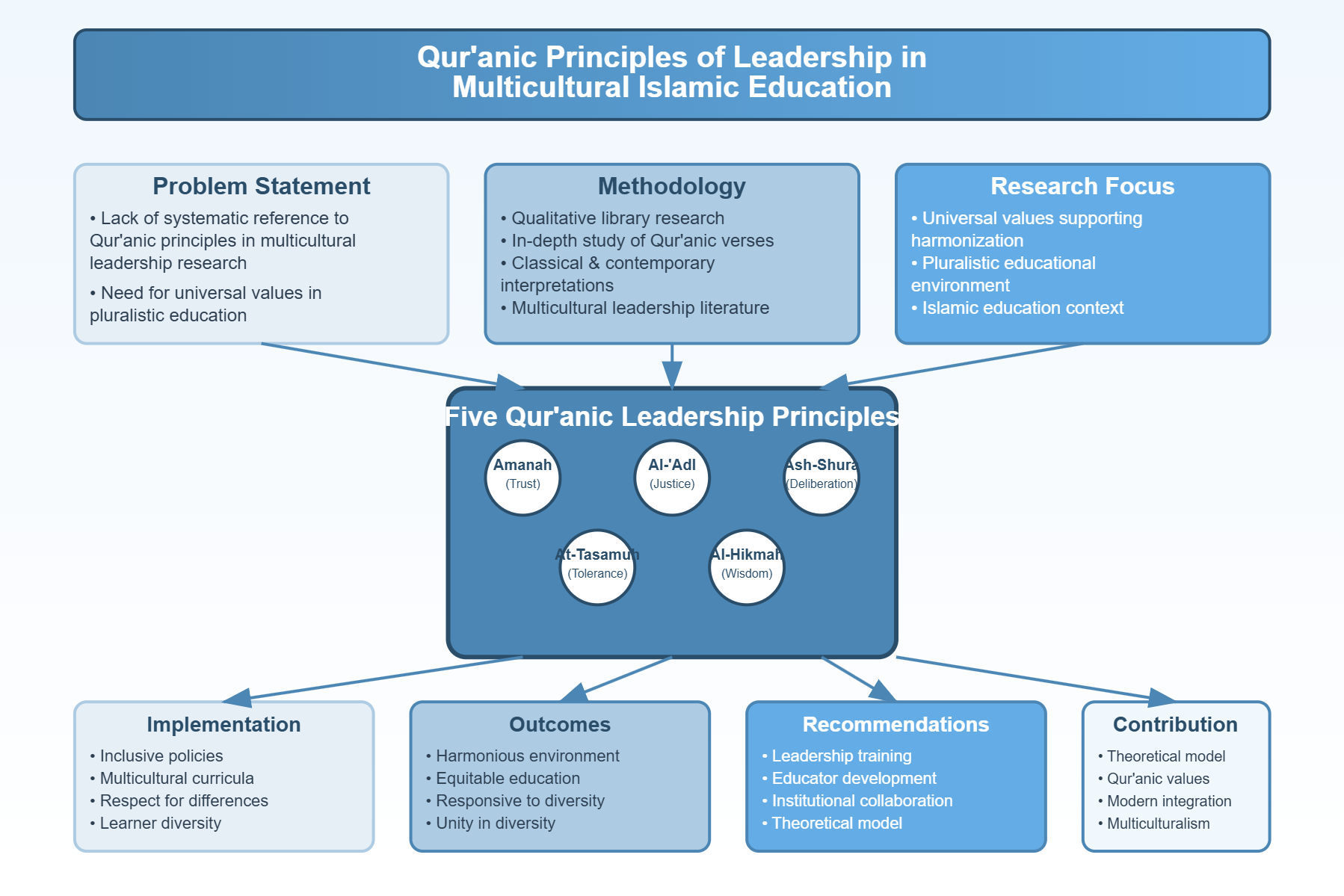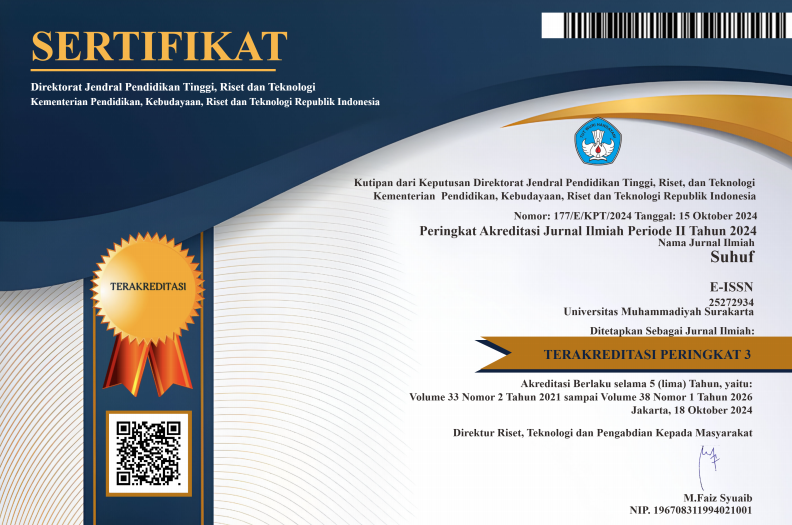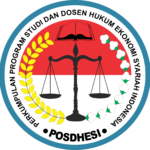Reconstructing Multicultural Islamic Education: A Qur’anic Framework for Inclusive Pedagogy
DOI:
https://doi.org/10.23917/suhuf.v37i1.10125Keywords:
Diversity , Justice, Islamic leadership , Multicultural education , The Qur’anAbstract
Research on multicultural leadership has not systematically referred to the principles of the Qur'an in the context of Islamic education. This research aims to examine the principles of leadership in multicultural Islamic education based on the perspective of the Qur'an, focusing on universal values that support harmonization in a pluralistic educational environment. The research method used is qualitative with a library research approach, where data is collected through an in-depth study of Qur'anic verses, classical and contemporary interpretations, and literature related to multicultural leadership and education. The results of this study show that the Qur'an establishes five main principles of leadership in multicultural Islamic education: Amanah, al-'is (justice), ash-shura (deliberation), at-tasamuh (tolerance), and al-hikmah (wisdom). These principles are theoretical and can be implemented in practice through inclusive policies, the development of multicultural-based curricula, and the fostering of respect for differences among learners. This study concludes that integrating Qur'anic values in Islamic education leadership can be an effective solution to create an environment that is harmonious, equitable, and responsive to diversity. Practical recommendations include multicultural leadership training for educators and strengthening collaboration between educational institutions to promote unity in diversity. These findings contribute to a theoretical model of Islamic educational leadership based on Qur'anic values integrated with modern multiculturalism.
Downloads
References
[1] A. Muhajir, N. Naim, A. Z. Fitri, and A. Safi’i, “Approach to the Development of Multicultural Education Curriculum in Darul Hikmah Modern Islamic Boarding School Tulungagung, Indonesia,” Univers. J. Educ. Res., vol. 8, no. 5, pp. 1842–1847, 2020, doi: https://doi.org/10.13189/ujer.2020.080520.
[2] R. D. Dienaputra, “A prospective historical analysis of multiculturalism in Indonesia: A case of West Java,” Kasetsart J. Soc. Sci., vol. 44, no. 4, pp. 1147–1154, 2023, [Online]. Available: https://so04.tci-thaijo.org/index.php/kjss/article/view/268992
[3] F. Umam and M. Barmawi, “Indigenous Islamic Multiculturalism: Interreligious Relations in Rural East Java, Indonesia,” Ulumuna, vol. 27, no. 2, pp. 649–691, 2023, doi: https://doi.org/10.20414/ujis.v27i2.752.
[4] M. I. Yusuf, A. Maimun, and M. As’ ad, “Transformational Leadership of KH. Yusuf Hasyim in Preserving Traditional Islamic Education at Pesantren Tebuireng,” Munaddhomah J. Manaj. Pendidik. Islam, vol. 5, no. 4, pp. 383–394, 2024, doi: https://doi.org/10.31538/munaddhomah.v5i4.1430.
[5] W. Hammad and S. Shah, “Leading faith schools in a secular society: Challenges facing head teachers of Muslim schools in the United Kingdom,” Educ. Manag. Adm. Leadersh., vol. 47, no. 6, pp. 943–959, 2019, doi: https://doi.org/10.1177/1741143218775429.
[6] M. W. Shohib, M. Z. Azani, N. L. Inayati, D. Dartim, and A. Nubail, “Islamic Perspective on Organizational Citizenship Behavior Among Academic Staff in Indonesian State Islamic Higher Education: Is It Effective?,” Suhuf Int. J. Islam. Stud., vol. 36, no. 2, pp. 155–169, 2024, doi: https://doi.org/10.23917/suhuf.v36i2.4702.
[7] P. Manurung, A. H. Saragih, and P. Hasibuan, “A Study of the Philosophy of Education and Analysis of the Principles of Implementing Education according to the Al-Qur’an.,” Pharos J. Theol., vol. 105, no. 2, pp. 1–13, 2024, doi: https://doi.org/10.46222/pharosjot.105.28.
[8] M. E. Ruhullah and T. Ushama, “Tawhidic Leadership in the Modern World: Bridging Islamic Governance with Universal Values for Peace and Integrity,” Al-Shajarah J. Int. Inst. Islam. Thought Civilis., vol. 29, no. 2, pp. 329–364, 2024, doi: https://doi.org/10.31436/shajarah.v29i2.1970.
[9] F. Farihin, “Perspektif Islam dalam Kepemimpinan: Sebuah Studi di Lembaga Pendidikan Islam [An Islamic Perspective on Leadership: A Study in Islamic Educational Institutions],” Munaddhomah J. Manaj. Pendidik. Islam, vol. 4, no. 2, pp. 252–260, (in Indonesia), 2023, doi: https://doi.org/10.31538/munaddhomah.v4i2.446.
[10] A. Ahmad and M. Muslimah, “Memahami Teknik Pengolahan dan Analisis Data Kualitatif [Understanding Qualitative Data Analysis and Processing Techniques],” in Proceedings of Palangka Raya International and National Conference on Islamic Studies (PINCIS), 2021, pp. 173–186, (in Indonesia). [Online]. Available: https://e-proceedings.iain-palangkaraya.ac.id/index.php/PICIS/article/view/605
[11] A. Z. Mauludah, T. Ma’sum, and J. Iswanto, “Konsep Kepemimpinan Pendidikan Islam Perspektif Muhammad Quraish Shihab dalam Tafsir Al-Mishbah [The Concept of Islamic Educational Leadership According to Muhammad Quraish Shihab in Tafsir Al-Mishbah],” JIIP-Jurnal Ilm. Ilmu Pendidik., vol. 6, no. 11, pp. 9495–9501, 2023, doi: https://doi.org/10.54371/jiip.v6i11.2594.
[12] I. Nuzulla and I. Mubarok, “Pengaruh Kepemimpinan Berbasis Nilai-Nilai Islam Dalam Efektivitas Manajemen Komunikasi Organisasi [The Impact of Islamic Values-Based Leadership on the Effectiveness of Organizational Communication Management],” Student Res. J., vol. 1, no. 6, pp. 249–261, (in Indonesia), 2023, doi: https://doi.org/10.55606/srjyappi.v1i6.842.
[13] R. A. Gusli, “Implementasi Prinsip-Prinsip Dasar Manajemen Pendidikan Islam Berdasarkan Al-Qur’an di MTsN 1 Kota Pariaman [Implementing the Fundamental Principles of Islamic Educational Management Based on the Qur’an at MTsN 1 Kota Pariaman],” EduYorasaki J. Islam. Educ. Manag., vol. 1, no. 01, pp. 1–15, 2025, [Online]. Available: https://ejournal.yorasakiedu.com/jmpi/article/view/10
[14] U. Hasanah and H. Verawati, “Pendidikan Islam Multikultural : Analisis Historis Masa Dinasti Abbasiyah [Multicultural Islamic Education: A Historical Study of the Abbasid Period],” ASANKA J. Soc. Sci. Educ., vol. 3, no. 2, pp. 198–217, (in Indonesia), 2022, doi: https://doi.org/10.21154/asanka.v3i2.4847.
[15] I. Muliyanty, H. Hamdanah, and N. Fahmi, “Dasar Al-Qur’an Dan Hadits Tentang Kepemimpinan [The Foundations of Leadership in the Qur’an and Hadith],” J. Educ., vol. 6, no. 4, pp. 20928–20935, (in Indonesia), 2024, doi: https://doi.org/10.31004/joe.v6i4.6226.
[16] Herwati and W. Mushonifah, “Konsep Kepemimpinan Berbasis Qur’ani [The Concept of Leadership Based on the Qur’an],” Attract. Innov. Educ. J., vol. 3, no. 3, pp. 204–217, (in Indonesia), 2021, doi: https://doi.org/10.51278/aj.v3i3.286.
[17] A. A. Hidayat and I. Muttaqin, “Kepemimpinan Dalam Pendidikan Islam (Pengertian, Karakteristik Kepemimpinan Rasulullah, Karakteristik Kepemimpinan Islam dan Keberhasilannya) [Leadership in Islamic Education: Definition, Characteristics of the Prophet Muhammad’s Leadership, Features of I,” Katalis Pendidik. J. Ilmu Pendidik. dan Mat., vol. 1, no. 4, pp. 173–185, (in Indonesia), 2024, doi: https://doi.org/10.62383/katalis.v1i4.962.
[18] S. Mubarok, “Prinsip Kepemimpinan Islam dalam Pandangan Al-Qur’an [The Principles of Islamic Leadership from the Perspective of the Qur’an],” Al Muhafidz J. Ilmu Al-Qur’an dan Tafsir, vol. 1, no. 1, pp. 1–12, (in Indonesia), 2021, doi: https://doi.org/10.57163/almuhafidz.v1i1.2.
[19] R. Rahman, “Konsep Komunikasi Kepemimpinan Era Digital [The Concept of Leadership Communication in the Digital Era],” J. Ilm. Al-Muttaqin, vol. 9, no. 1, pp. 1–9, (in Indonesia), 2023, doi: https://doi.org/10.37567/al-muttaqin.v9i1.1927.
[20] N. Fitria, “Kajian Prinsip Dasar Manajemen Pendidikan Islam [A Study of the Fundamental Principles of Islamic Educational Management],” JIIP-Jurnal Ilm. Ilmu Pendidik., vol. 6, no. 8, pp. 6116-(in Indonesia), 2023, doi: https://doi.org/10.54371/jiip.v6i8.2454.
[21] T. S. Radjak, K. Yahiji, H. Anwar, and L. G. Otaya, “Kepemimpinan Dalam Al-Qur’an Dan Hadis [An Islamic Perspective on Leadership in the Qur’an and Hadith],” Al-Minhaj J. Pendidik. Islam, vol. 3, no. 3, pp. 259–270, (in Indonesia), 2021, [Online]. Available: https://journal.iaingorontalo.ac.id/index.php/alminhaj/article/view/4480
[22] S. Nahdiaturrosidah and N. Efendi, “Konsep Dasar Kepemimpinan dalam Pendidikan Islam [The Basic Concept of Leadership in Islamic Education],” Glob. Leadersh. Organ. Res. Manag., vol. 3, no. 1, pp. 183–194, (in Indonesia), 2025, doi: https://doi.org/10.59841/glory.v3i1.2332.
[23] S. Sulisniati and Z. E. Hasibuan, “Dasar Kepemimpinan Pendidikan Dalam Al-Qur’an dan Hadist,” AMI J. Pendidik. DAN Ris., vol. 3, no. 1, pp. 9–13, 2025.
[24] A. Abubakar and D. Abdullah, “PRINSIP MUSYAWARAH DALAM AL-QUR’AN (Study Tematik atas Ayat-Ayat Syura) [The Principle of Consultation (Shura) in the Qur’an: A Thematic Study of Shura Verses,” J. Kaji. Pendidik., vol. 7, no. 1, pp. 100–116, (in Indonesia), 2025, [Online]. Available: https://journalpedia.com/1/index.php/jkp/article/view/4462
[25] S. Kaaffah, H. Fajrussalam, A. Rahmania, J. Ningsih, M. K. Rhamadan, and P. Mulyanti, “Menumbuhkan sikap toleransi antar agama di lingkungan multikultural kepada anak sesuai ajaran agama Islam [Fostering Interreligious Tolerance in Children within a Multicultural Environment Based on Islamic Teachings],” JPG J. Pendidik. Guru, vol. 3, no. 4, pp. 289–314, (in Indonesia), 2022, doi: https://doi.org/10.32832/jpg.v3i4.7395.

Downloads
Submitted
Accepted
Published
How to Cite
Issue
Section
License
Copyright (c) 2025 Rahmad Espihani, M Muslimah , N Normuslim , M Mualimin

This work is licensed under a Creative Commons Attribution 4.0 International License.


















